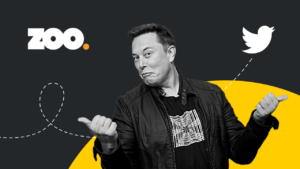April 27, 2022 / Thought Leadership
So What Does the Twitter Ownership Change Mean for Advertisers?
ZOO Digital
 With the recent announcement of Elon Musk’s deal to buy Twitter, we looked into some of the consequences this may have for advertisers who rely on the platform.
With the recent announcement of Elon Musk’s deal to buy Twitter, we looked into some of the consequences this may have for advertisers who rely on the platform.
Here’s a quick summary some implications of his takeover that we know so far:
Likely changes to censorship rules to come
- Elon Musk has previously promised to reduce censorship on the platform.
- Describing himself as a “free speech absolutist”, Musk has spoken out against Twitter’s content-moderation practices designed to make the platform safer for advertisers, by keeping toxic and violent content off the social network.
- According to advertisers, Musk’s switch from the constraints of censorship to online free speech could mean ads are shown adjacent to controversial content that brands would not want to be associated with.
- However, the EU has just passed new digital content rules that will soften some of Musk’s cough when it comes to relaxing too many rules around hate speech or threats to violence. There are eye watering financial penalties for social media firms for failure to protect what is said online.
An unclear road for the role of advertising in the Twitter business model
- Musk has previously tweeted that under his new leadership, Twitter would have “no ads. The power of corporations to dictate policy is greatly enhanced if Twitter depends on advertising money to survive.” That tweet has since been deleted.
- Most of Twitter’s revenue comes from advertising – in Q4, 2021, the company reported advertising revenue of $1.41 billion out of $1.57 billion in total revenue during that quarter.
- Ads account for nearly 90% of Twitter’s revenue now, while data licensing accounts for most of the rest.
- The $5 billion-a-year advertising business model is now under the leadership of someone whose current company, Tesla, buys no advertising.
Corporate reputations again to the fore when it comes to ad budgets
- Brian Wieser, the global president of business intelligence at ad-buying company GroupM, claims most advertisers who use the platform “strongly prefer content standards” on Twitter.
- Advertisers will likely be reluctant to have their message in the same timeline as anti-Semitism or violence again women.
- “The advertising industry is wary of Musk’s proposal to loosen speech rules on Twitter”, according to Mike Zaneis, co-founder of the Brand Safety Institute, a nonprofit organisation of digital advertisers concerned about objectionable material online.
- “Nobody wants to go back to the Wild, Wild West,” Zaneis said, referring to a time when forums and social media platforms had little-to-no content moderation. “It was painful. It was harmful to brands. It was harmful to citizens. We’ve made incredible strides, and I think a reversal would be unfortunate.”
- Ad agencies have expressed concern that Musk’s unconstrained approach to Twitter will make the social media platform less safe for brands.
- However, some don’t expect that there will be an immediate change in ad dollar spend until advertisers see a material change in the policies.
So….
So, what we do know is that changes are highly likely in the Twittersphere. What those changes actually mean when bottom lines and reputations come into play are yet to be seen. For now, your ad budgets are operating under the current rules of conduct and corporate reputation management. However, watch this space ad buyers. Don’t know about you, but we’re putting an alert on Elon Musk’s Twitter account.
Sources: BBC, Wall Street Journal, NBC News, Yahoo Finance, Politico Europe
 brief us?
brief us?





